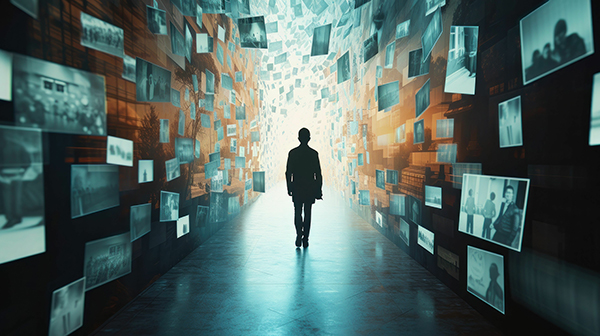Powerful Mind Part 28
Welcome to this week’s Bill Harvey Blog – August 30, 2024
Created September 15, 2023

Look back over your life and see what you can about what you apparently wanted most at different turning points in your adventure.
Now that we are embarked on Key #6, which focuses you on a deep dive study of what you really want out of life, it will be helpful and fun for you to look back over your life and see what you can about what you apparently wanted most at different turning points in your adventure.
This is a task best approached in an alone space where you have made yourself temporarily invulnerable to interruption and distraction. Now that you have made the commitment to using your mind in the most powerful ways possible, you’ll find that having a daily alone space is almost essential. If others ask why you need to be alone for 20 or more minutes each day, “meditation” is the simplest explanation, although our forms of meditation in the 12 Keys encompass what in ancient India and around the world forever have been known as meditation, contemplation, and concentration – three forms of applying the mind in very special and important ways.
Neuroscience has identified one of the networks of the brain as the Default Network, which is the type of brain pattern most people use most of the time. It is essentially random chatter, and having observed it in myself, most of my life I have called it Emergency Oversimplification Procedure (EOP), because it avoids deep thinking in favor of following attraction and repulsion impulses. In popular science it is identified with Kahneman’s construct of System1, which Daniel himself admitted might not be an actual system in the brain.
A second real system in the brain (which corresponds somewhat with Kahneman’s System2) is called the Executive Control Network, and it is associated with metacognition and what I call the Observer state. A third is called the Saliency Network, and it is associated with whatever is the most relevant pressing matter to you at the moment, and which will bring on transition to the Executive Control Network in situations in which that will tend to be most useful to dealing with whatever is most salient to you at the moment.
Meditation, contemplation and concentration are modes of cognition that depend mostly on the Executive Control Network. Piaget’s Formal Operational Level is his theoretical stage at which children are able to pick apart problems and systematically pursue and test solutions, and this would appear to be a stage in which the child has begun to regularly employ the Executive Control Network.
Depending upon your physical exercise regimen, it may be possible to combine your alone space with your exercise. This is not always the case because often our mental exercises will work best if you can write down flashes you have, and in some cases doodle something, such as the schematic of your life we are about to describe.
Take a fresh sheet of paper and allow yourself to doodle on it any way you feel like. In this case we are going to be looking back over your life to see what we can infer about what wants motivated you most during certain phases, so you might want to use the pad you are writing on in landscape aspect, so that you have the whole length of the pad for the vector of your life. You might want to add a scale at the bottom showing the ages from birth, and 1 year old, at the left, running up to your present age at the right.
In that framework you will find bubbling up in your mind stuff that would fall somewhere along that trajectory, and you can make an oval with words in it to mark what was going on at a certain age. Before you begin, let’s review the 15 motivations that my own empirical research at RMT (Research Measurement Technologies) has detected in human beings.
The 15 RMT Motivational Types
-
- Security – Feeling safe, rather than insecure; to no longer feel fear
- Belonging – Being part of a group; know that one is not alone in the world; to have support
- Achievement – A sense of accomplishment; to do something significant in one’s life
- Aspiration/Learning – Wanting to know more; to reach a higher level of understanding
- Competency – Wanting to be really good at something
- Fitness – Wanting to have a strong and attractive, healthy body
- Status/Prestige – Recognition from others; consensus validation of one’s own importance
- Wealth/Success – Affluence; freedom to spend on whatever one wants; ignore others’ criticism
- Heroism/Leadership – Acting heroically anytime; to speak up and take responsibility for situations
- Experience/Sex/Good Life/Hedonism/Epicureanism – Wanting interesting and fun experiences; to have a good time, enjoy the best of life, and see the world
- Power – Being able to control other people and situations to one’s liking
- Love – Wanting to love someone and be loved by the same person
- Creativity – Being creative in arts, business, crafts, nonprofits, sciences, technologies, or any field
- Self-Knowledge – Knowing oneself — who you are deep inside; mastery of one’s mind and emotions
- Self-Transcendence/Service to Humanity/Enlightenment/Spiritual Awakening/Nobility – Making a positive difference in the world; to take care of other people.
Taking my own life as an example, during my pre-school years I can recall incidents suggesting these motivations: Security, Belonging, Achievement, Aspiration/Learning, Competency – the first five on the list – plus Love, Creativity, and Self-Knowledge. My parents put me on stage and after many robotical performances (motivated by a desire for Competency) I experienced the Flow state, which was a turning point in my life. Aspiration/Learning what Flow state was, became a burning desire.
During kindergarten and elementary school I can see in my own memories that Status/Prestige became more important to me than it had been earlier. Power became important because these were the streets of pre-gentrification Brooklyn at a time of bullies, knives, and zipguns.
I spent a lot of time alone, thinking, and observing my own thinking and feeling. I had early thoughts about how I might help fix the world, which in those years had just used atomic bombs for the first time, and I knew this was the biggest future threat. I had the idea to gain power to effect positive change by going to West Point, becoming a General, surviving and winning WWIII, and then being elected President, where I felt I could right the many wrongs I saw, heard about, and read about, implying that I had begun to manifest the motivation of Self-Transcendence (Altruism).
At age 12, with a knife to my throat, I told the kid with the knife “I don’t believe you’re crazy, so I don’t believe you’d cut me, so I’m not scared.” That turned out to work. I feel that Heroism/Leadership was motivating me then, and perhaps earlier.
At the same age I had two out of body experiences and the onset of puberty. As if these were not enough, I also heard a voice in my mind say “I am God and so is everyone else.” This made no sense since I was in my own mind an atheist dedicated to pure science. Experience/Sex/The Good Life bloomed motivationally, I wanted to have a wide range of experiences and see the world.
By 16 I had graduated high school and my father had obtained for me two Congressional recommendations to West Point, but I was a year too young to be admitted. I went to Brooklyn College for a year and joined the Air Force ROTC. Leadership spiked as one of my top motivations for a while. However the ROTC turned me off as regards West Point and so I changed course and studied philosophy and psychology, the two subjects I had thought about every day of my life from my earliest memories. I also began to care about Fitness and got into the best shape of my life.
Graduating and taking the first job offer (Grey Advertising) Wealth/Success leapt up as a priority motivation. Aspiration/Learning and Competency once again became predominant motivations as I sopped up all the lore of marketing and advertising and media as fast as I could.
That’s probably enough about me, to give you an idea of how you can look at your own life through the lens of what motivated you at each stage. This will give you more grist for the mill to figure yourself out today, and where you go from here, what you want out of life now, and how you are going to get it. Enjoy the journey inside!
Love to all,
![]()



